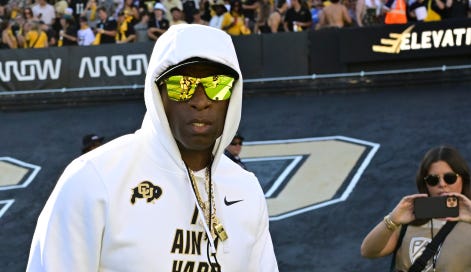We continue our study series on
’s book, Range, covering chapter 2 with a hot topic of a current eventFor my latest Christ and Pop Culture column, I wrote about Coach Prime Deion Sanders and the Colorado Buffalo football team. You can read it here. Yet, seeing how relevant the Buffalo's remain after a highly embittered and emotionally charged rivalry win over the Colorado State Rams recently, I think it's appropriate to use them as a subject for our subsequent chapter analysis in David Epstein's book Range covering chapter 2.
Only one person and personality can accomplish what Coach Prime, Deion Sanders, has done in college football the way Coach Prime conducted it so far. But his use of "range"—the generalist approach for obtaining a specific goal—is a skill we can learn from. Coach Prime's knack for taking all available resources around him—the noise, critique, spotlight, and much more—and using it as fuel to get the best performance out of his team is a testimony to the "range" David Epstein explores in his book.
Coach Prime doesn't shy away from the spotlight. He's been this way his whole career. As a multi-sport athlete and still the only professional athlete to ever score a touchdown in the NFL and hit a home run in an MLB game, Coach Prime is the ultimate poster boy for range. Now, he's taken his experiences as a professional athlete and is sharing them with upcoming athletes, including his sons Shedeur and Shilo, who play for him at Colorado. He's teaching them how to embrace the spotlight, criticism, and pressure to achieve the best results and prepare them for a professional career.
Coach Prime's approach is different than most football coaches. Most of us want our athletes focused on only one thing—the game. "Stay locked in," we tell our athletes. We ask them to block out all the noise and focus only on the tasks in front of them. We tell athletes this because we think they can't handle the pressure of success. Coaches attempt to force athletes into a specialized version of themselves instead of showing them a generalized approach of taking in all of their surroundings as a means of helping them achieve the team's goals.
So, upon closer observation, Coach Prime is showing his kids the type of skill set David Epstein explores in Range. Instead of giving his athletes a specific mastery to focus on, he's preparing them for the whole gambit of responsibilities they'll be expected to manage in the next stage of their lives, even those who don't go on to play professional football. As Epstein says: "[Students] must be taught to think before being taught what to think about. Students come prepared with scientific spectacles, but do not leave carrying a scientific-reasoning Swiss Army Knife" (p. 50). All the players on Colorado's football team will eventually leave carrying a scientific-reasoning Swiss Army Knife of leadership, grit, discipline, and more because of Coach Prime and his staff's lessons that extend beyond football.
So, the lesson for us in all of this is to embrace the noise. The more we try to ignore the distractions, the louder they become. But if we acknowledge outside distractions, something in that noise may help solve the problems in front of us. We need not become so specialized in our approach to a specific problem that we ignore the potential solutions with a generalized approach to solving our problems. Epstein writes, "And that is what a rapidly changing, wicked world demands—conceptual reasoning skills that can connect new ideas and work across contexts" (p. 53).





